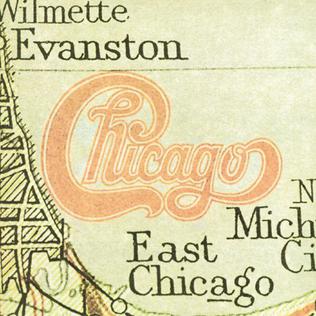
Chicago XI is the ninth studio album by the American soft rock band Chicago. It was released on September 12, 1977 through Columbia Records. It was both the last to feature guitarist and vocalist Terry Kath prior to his death in a gun accident just over four months later, and the last to be produced by longtime associate of the band James William Guercio.
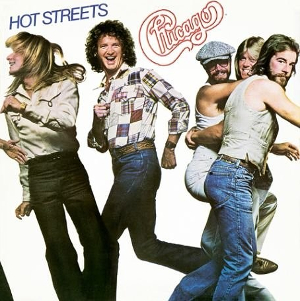
Hot Streets is the tenth studio album by the American soft rock band Chicago, released on October 2, 1978 by Columbia Records. This was the band's first album with all-new material released since their second that did not have a numbered title. It was also the first album not to feature original guitarist/vocalist Terry Kath, who died from an accidental self-inflicted gunshot wound in January 1978. He was replaced by Donnie Dacus on this album.
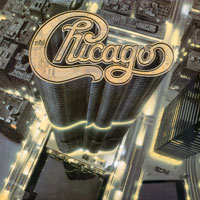
Chicago 13 is the eleventh studio album by American soft rock band Chicago, released on August 13, 1979 by Columbia Records. Chicago 13 was the band's final release featuring lead guitarist Donnie Dacus, who had followed the late founding member, guitarist Terry Kath. All band members contributed to the songwriting.
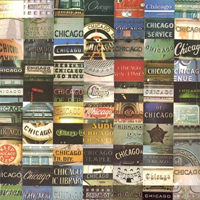
Greatest Hits, Volume II is the second greatest hits album by American soft rock band Chicago, released on November 23, 1981 by Columbia Records.
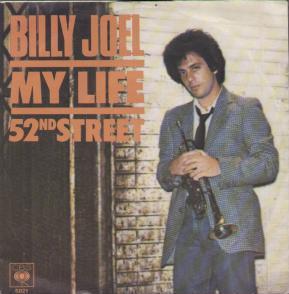
"My Life" is a song by Billy Joel that first appeared on his 1978 album 52nd Street. A single version was released in the fall of 1978 and reached No. 2 on the U.S. adult contemporary chart. Early the next year, it peaked at No. 3 on the Billboard Hot 100.

"Beginnings" is a song written by Robert Lamm for the rock band Chicago Transit Authority and recorded for its debut album Chicago Transit Authority, released in 1969. The song is the band's second single, but failed to chart on its initial release.

"Does Anybody Really Know What Time It Is?" is a song written and sung by Robert Lamm and recorded by the group Chicago. It was included on their 1969 debut album Chicago Transit Authority and released as a single in 1970.

"Feelin' Stronger Every Day" is a song written by Peter Cetera and James Pankow for the group Chicago and recorded for their album Chicago VI (1973). The first single released from that album, it reached #10 on the U.S. Billboard Hot 100.

"Just You 'n' Me" is a song written by James Pankow for the group Chicago and recorded for their fifth studio album Chicago VI (1973). The lead vocals are sung by bassist Peter Cetera.

"(I've Been) Searchin' So Long" is a song written by James Pankow for the group Chicago and recorded for their album Chicago VII (1974). The first single released from that album, it reached number 9 on the U.S. Billboard Hot 100. It also hit number 8 on the Adult Contemporary chart. In Canada, the song peaked at number 5.

"Call on Me" is a song written by Lee Loughnane for the group Chicago and recorded for their album Chicago VII (1974). Peter Cetera sang lead vocals and the arrangement makes prominent use of conga drums played by Guille Garcia.

"Wishing You Were Here" is a song written by Peter Cetera for the group Chicago and recorded for their album Chicago VII (1974), with lead vocals by Terry Kath, while Cetera sang the song's bridge. The third single released from that album, it reached No. 11 on the U.S. Billboard Hot 100, No. 9 on the Cash Box Top 100, and hit No. 1 on the Easy Listening chart.
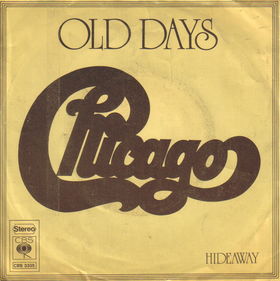
"Old Days" is a song written by James Pankow for the group Chicago and recorded for their album Chicago VIII (1975). It was the second single released from that album with lead vocals by Peter Cetera.

"Another Rainy Day in New York City" is a song written by Robert Lamm for the group Chicago and recorded for their album Chicago X (1976). Described as "the only typical Chicago cut on the album[:] upbeat and light with good blending of lead vocal by [Peter] Cetera", the track would be the album's lead single but was largely passed over for radio airplay in favor of the album cut "If You Leave Me Now". Rush-released as a single, "If You Leave Me Now" debuted on the Billboard Hot 100 of 14 August 1976 at No. 60 - on its way to No. 1 - and immediately eclipsed "Another Rainy Day..." which on the same chart fell to No. 46 from its No. 32 peak. "Another Rainy Day..." peaked at No. 2 on the Billboard Adult Contemporary chart. Billboard described the song as "a pop /jazzy rocker with a touch of reggae flavor." Cash Box said that "the lyric is good, really creates a mood." Record World called it a "Caribbean-styled number is handled with the band's consummate professionalism and good taste."

"Baby, What a Big Surprise" is a ballad written by Chicago's then bassist/singer Peter Cetera, which appeared on their album Chicago XI (1977), with Cetera singing lead vocals. The first single released from the album reached number 4 on the US Billboard Hot 100 chart.

"Alive Again" is a song written by James Pankow for the group Chicago and recorded for their album Hot Streets (1978), with Peter Cetera singing lead vocals. The first single released from that album, it reached No. 14 on the U.S. Billboard Hot 100 chart. In Canada, "Alive Again" spent two weeks at No. 11.
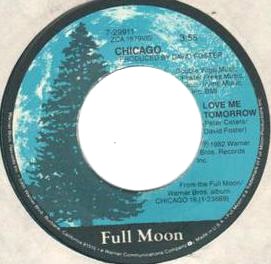
"Love Me Tomorrow" is a song written by Peter Cetera and David Foster for the group Chicago and recorded for their album Chicago 16 (1982), with Cetera singing lead vocals. The second single released from the album, it reached No. 22 on the U.S. Billboard Hot 100 chart and No. 8 on the adult contemporary chart. Songwriter Cetera, a member of the American Society of Composers, Authors and Publishers (ASCAP), won an ASCAP Pop Music Award for the song in the category, Most Performed Songs.
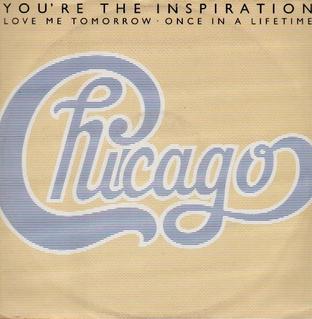
"You're the Inspiration" is a song written by Peter Cetera and David Foster for the group Chicago and recorded for their fourteenth studio album Chicago 17 (1984), with Cetera singing lead vocals. The third single released from that album, it reached No. 3 on the US Billboard Hot 100 chart in January 1985 and also climbed to the top position on the Adult Contemporary chart at the same time. The song won honors for Cetera from the American Society of Composers, Authors and Publishers (ASCAP), in 1986 in the most-performed songs category.

"Will You Still Love Me?" is a song recorded by the American rock band Chicago for their studio album Chicago 18 (1986). The song was written by David Foster, Tom Keane and Richard Baskin.

"Brand New Love Affair" sometimes alternatively listed as "Brand New Love Affair (Parts I and II)", is a song written by James Pankow for the group Chicago and recorded for their album Chicago VIII. The song peaked at #61 on the charts. Guitarist Terry Kath sings the first half while bassist Peter Cetera sings the second half. Keyboardist Robert Lamm played the distinctive Fender Rhodes electric piano on the song—the intro particularly showcases its lush vibrato bell-like sound.




















